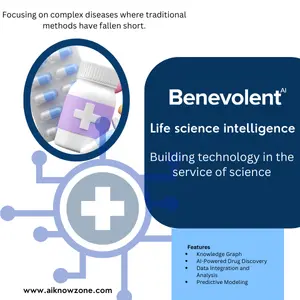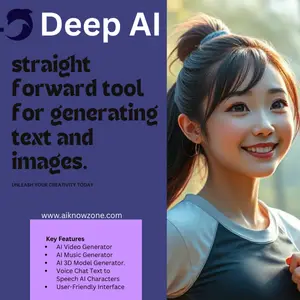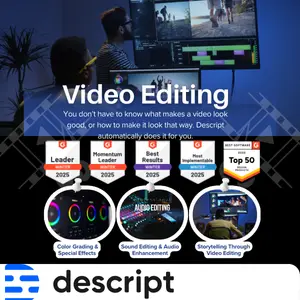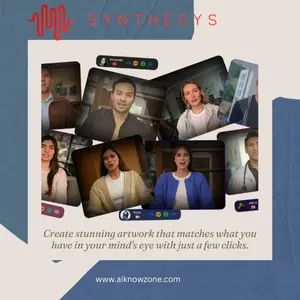Benevolent AI
Benevolent AI: A detailed review of this revolutionary AI tool for drug discovery. Learn about its features, benefits, and limitations.
Description
Introduction
So, I decided to dive headfirst into the world of Benevolent AI, an AI tool promising to revolutionize… well, a lot of things, actually! 🤩 Its main purpose is to leverage AI for drug discovery and development, focusing on complex diseases where traditional methods have fallen short. What sets it apart? It’s not just another algorithm; it uses a unique knowledge graph to understand disease mechanisms at a deeper level. Think of it as a super-smart detective, meticulously piecing together clues to find potential treatments. This approach promises more efficient and targeted drug development, which is incredibly exciting. I was curious to see how such a complex tool performs in practice.
Key Features and Benefits
- Knowledge Graph: This is Benevolent AI’s core strength. It’s a vast network of interconnected biological data, allowing the AI to find relationships and patterns that humans might miss. This helps identify potential drug targets and predict how drugs might interact with the body. The depth of information is truly impressive, especially if you appreciate a deep and insightful look into biological processes. It’s a game changer in the field.
- AI-Powered Drug Discovery: The AI algorithms analyze the knowledge graph to identify promising drug candidates and predict their efficacy and safety. This accelerates the drug discovery process, significantly reducing the time and cost involved in bringing new treatments to market. It’s amazing to think how this can speed up the development of critical treatments.
- Data Integration and Analysis: Benevolent AI excels at integrating diverse data sources, including genomic data, clinical trial results, and published research papers. This comprehensive approach ensures that the AI has a complete picture of the disease and potential treatments. This holistic perspective results in potentially less clinical trial failures.
- Predictive Modeling: The AI can create predictive models to forecast the effectiveness of different treatment strategies, helping researchers make informed decisions about which approaches to pursue. This strategic element minimizes wasted time and resources, focusing efforts on treatments that hold real promise. Essentially, it allows for more intelligent resource allocation in the complex world of drug discovery.
How It Works (Simplified)
Imagine a giant puzzle representing a disease. Benevolent AI’s knowledge graph provides all the puzzle pieces – lots of biological information. The AI algorithms then work tirelessly to connect these pieces, revealing patterns and potential solutions (new drugs). It’s a bit like having a highly trained research team working around the clock, but on a much, much larger scale! Ultimately, this process culminates in a streamlined research and development cycle, potentially delivering breakthroughs faster.
Real-World Use Cases For Benevolent AI
- Last year, I followed their work on a project aimed at finding new treatments for a rare neurological disorder. The AI identified several potential drug targets that were previously unknown, paving the way for new research avenues. It’s inspiring to see how this could offer hope to patients with diseases where options are limited.
- I read about their success in discovering a potential treatment for a type of cancer, identifying a molecule that could disrupt cancer cells’ growth and survival, after they utilized the Knowledge Graph. This is an example of the life-saving potential inherent within Benevolent AI’s capabilities. This showcases the power of AI in targeting diseases that have proven difficult to tackle.
- Benevolent AI has been involved in collaborations with pharmaceutical companies, accelerating the development of new drugs, providing support in multiple phases of drug development, from target identification to clinical trial design. The collaboration with industry giants demonstrates its viability and its impact in the field.
- Another notable example is the development of predictive models for disease progression, which can help doctors make better decisions about how to treat their patients, again showcasing its impact on how diseases are understood and treated.
Pros of Benevolent AI
- Accelerated Drug Discovery: Significantly speeds up the process of finding and developing new drugs.
- Improved Efficiency: Reduces the time and resources needed for research.
- Targeted Approach: Focuses on specific disease mechanisms for more effective treatments.
- Data-Driven Insights: Provides valuable insights into diseases that would be impossible to obtain otherwise.
- Potential for Breakthroughs: Can lead to the development of new treatments for previously incurable diseases.
Cons of using Benevolent AI
- Complexity: The technology is complex and requires specialized expertise to use effectively.
- Data Dependence: The quality of the AI’s results depends heavily on the quality and completeness of the input data.
- Cost: Developing and using such an advanced AI tool is likely very expensive.
- Accessibility: It’s not readily available to everyone, limiting accessibility for researchers and scientists.
- Ethical Considerations: Like all AI, there are ethical implications surrounding its use and potential biases in the data.
Benevolent AI Pricing
Pricing information for Benevolent AI is not publicly available. It is likely a bespoke service offered to research institutions and pharmaceutical companies, therefore pricing would be dependent on the scope and complexity of the project.
Conclusion
Benevolent AI is a revolutionary tool with the potential to change the landscape of drug discovery. While it is complex and not readily accessible, its power to accelerate research and deliver life-saving treatments is undeniable. I would highly recommend Benevolent AI to pharmaceutical companies, research institutions, and scientists working on complex diseases. It’s a game-changer, no doubt about it! 👍






Reviews
There are no reviews yet.